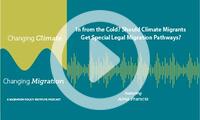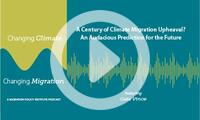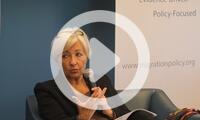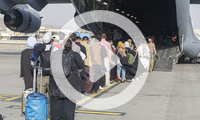Asylum Seekers
Recent Activity

Marking one year since Russia's invasion of Ukraine and the resulting massive displacement crisis, this MPI Europe webinar examines the situation of those fleeing the war who have found refuge in Europe, implementation of the Temporary Protection Directive, integration outcomes and challenges for Ukrainian refugees, and plans for a future that contemplates reintegration for Ukrainians who will

Should countries extend legal protections to people displaced by climate change? This episode of Changing Climate, Changing Migration contemplates the merits of such an approach, featuring Ama Francis, a climate displacement project strategist with the International Refugee Assistance Project and Columbia Law School’s Sabin Center for Climate Change Law.

As the planet’s temperature warms, award-winning environmental journalist Gaia Vince thinks humanity is facing a chaotic century of mass migration spurred by climate change? In this episode of Changing Climate, Changing Migration, she contemplates a future in which hundreds of millions of people move from one part of the globe to another.

Monique Pariat, the European Commission’s Director General for Migration and Home Affairs, spoke to the DC policy community on Europe’s rapid response to the Ukrainian displacement crisis, lessons learned, and considerations for future policies.

Marking the one-year withdrawal of U.S. troops from Afghanistan and the fall of Kabul to the Taliban, this webinar reflects on the humanitarian and development challenges in Afghanistan and for neighbors, the difficult choices facing aid donors, and what needs to be done to ensure at-risk Afghans can reach safety.
Pages
Recent Activity
El paso por el Tapón del Darién ha transformado la migración en las Américas. Cada día, más de 1.000 personas cruzan lo que no hace mucho era un tramo de selva poco transitado entre Colombia y Panamá, la mayoría con la esperanza de llegar a Estados Unidos o Canadá. Es un viaje increíblemente arriesgado. Los gobiernos se han esforzado por responder al creciente movimiento, que se espera que supere los 500.000 cruces en 2023.















Addressing the Next Displacement Crisis in the Making in the Americas
The next major displacement of people in the Americas is in the making, and it is going unnoticed. The response to the steady emigration from Haiti seen since a devastating 2010 earthquake has been largely haphazard and may not stand the test of new spikes as the country unravels further. This commentary suggests a way forward, based on a model used for the Venezuelan displacement crisis.